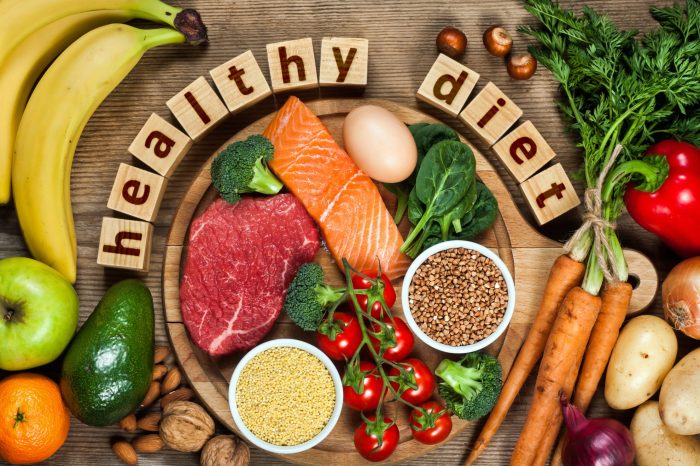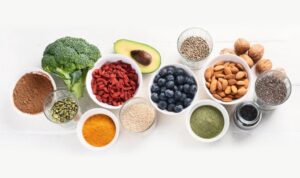Starting off with balanced diet, this intro is here to grab your attention and give you the lowdown on why it’s crucial for your well-being. Get ready to dive into the world of nutrition and health!
Importance of a Balanced Diet

Eating a balanced diet is crucial for maintaining overall health and well-being. It provides the necessary nutrients, vitamins, and minerals that our bodies need to function optimally. A balanced diet helps prevent diseases, boosts energy levels, improves mood, and supports healthy growth and development.
Food Groups in a Balanced Diet
Incorporating a variety of food groups into your diet is essential for achieving balance. These food groups include:
- Fruits and Vegetables: Rich in vitamins, minerals, and antioxidants that support immune function and overall health.
- Proteins: Essential for building and repairing tissues, as well as supporting muscle growth and maintenance.
- Whole Grains: Provide fiber, which aids in digestion and helps regulate blood sugar levels.
- Dairy or Dairy Alternatives: Good sources of calcium and vitamin D for bone health.
- Healthy Fats: Found in foods like nuts, seeds, and avocados, essential for brain function and hormone production.
Benefits of a Balanced Diet
A balanced diet offers numerous benefits, including:
- Weight Management: Helps maintain a healthy weight and reduce the risk of obesity-related diseases.
- Improved Energy Levels: Provides sustained energy throughout the day, reducing fatigue and improving productivity.
- Enhanced Mood: Nutrient-rich foods can positively impact mood and mental health.
- Stronger Immune System: Supports a robust immune system, making you less susceptible to infections and illnesses.
- Healthy Aging: Promotes longevity and overall well-being as you age.
Components of a Balanced Diet

Eating a balanced diet is crucial for maintaining good health. It involves consuming the right amounts of various nutrients to support proper bodily functions and overall well-being.
Carbohydrates
Carbohydrates are the body’s main source of energy. They are broken down into glucose, which fuels our cells and provides the energy needed for daily activities. Good sources of carbohydrates include whole grains, fruits, vegetables, and legumes.
Proteins, Balanced diet
Proteins are essential for building and repairing tissues in the body. They are made up of amino acids, which are the building blocks of proteins. Sources of protein include meat, poultry, fish, dairy products, legumes, and nuts.
Fats
Fats are another important source of energy and help in the absorption of fat-soluble vitamins. They also play a role in maintaining healthy skin and hair. Healthy fats can be found in avocados, nuts, seeds, and olive oil.
Vitamins and Minerals
Vitamins and minerals are essential for various bodily functions, such as immune system support, bone health, and energy production. They are found in a variety of foods, including fruits, vegetables, whole grains, dairy products, and lean proteins.
Water
Water is often overlooked but is a crucial component of a balanced diet. It helps in digestion, nutrient absorption, and the regulation of body temperature. Staying hydrated is key to maintaining overall health.
Planning a Balanced Diet
Planning a balanced diet is essential for maintaining good health and well-being. It involves making conscious choices about the foods we eat to ensure we are getting the right nutrients in the right amounts.
Tips for Different Age Groups
- Children: Include a variety of colorful fruits and vegetables in their meals to ensure they get a range of vitamins and minerals. Limit sugary snacks and opt for whole grains and lean proteins.
- Adults: Focus on incorporating lean proteins, whole grains, healthy fats, and plenty of fruits and vegetables. Watch portion sizes and limit processed foods high in sugar and unhealthy fats.
- Elderly: Pay attention to adequate protein intake to maintain muscle mass, include sources of calcium and vitamin D for bone health, and ensure plenty of fiber to support digestion.
Incorporating Variety into Meals
Adding variety to your meals not only makes eating more enjoyable but also ensures you are getting a wide range of nutrients. Try experimenting with different cuisines, exploring new fruits and vegetables, and incorporating plant-based proteins like beans and legumes.
Importance of Portion Control and Moderation
- Practice portion control by using smaller plates, measuring servings, and being mindful of portion sizes to avoid overeating.
- Moderation is key to a balanced diet. Enjoy your favorite treats in moderation while focusing on nutrient-dense foods for the majority of your meals.
Impact of a Balanced Diet on Health
Eating a balanced diet has a significant impact on overall health and well-being. Not only does it provide essential nutrients for the body to function properly, but it also plays a crucial role in preventing various health conditions.
Prevention of Health Conditions
- Obesity: A balanced diet helps maintain a healthy weight by providing the body with the right nutrients without excess calories. This can reduce the risk of obesity and related health issues.
- Heart Disease: Consuming a variety of fruits, vegetables, whole grains, lean proteins, and healthy fats can lower cholesterol levels and reduce the risk of heart disease.
- Diabetes: By controlling blood sugar levels through proper nutrition, a balanced diet can help prevent or manage diabetes.
Relationship with Mental Health
- Nutrient Intake: Nutrients from a balanced diet can support brain function and mental well-being, potentially reducing the risk of mental health disorders.
- Stress Management: Eating a balanced diet can help regulate stress hormones and improve mood, contributing to better mental health outcomes.
Success Stories/Cases
- Case Study: Sarah, a working professional, struggled with fatigue and low energy levels. After adopting a balanced diet rich in whole foods, she experienced increased energy, improved focus, and overall better mood.
- Success Story: John, a former athlete, faced weight gain and joint pain after retirement. Through a balanced diet and regular exercise, he was able to lose weight, reduce inflammation, and improve his overall health and quality of life.
Common Myths and Facts about Balanced Diets
When it comes to balanced diets, there are several misconceptions that people have. Let’s debunk these myths with evidence-based facts and examples of how following a balanced diet can positively impact individuals.
Myth: Carbs are Bad for You
Despite popular belief, not all carbs are bad for you. In fact, carbs are an essential source of energy for the body. The key is to choose complex carbohydrates like whole grains, fruits, and vegetables over simple carbs like sugary snacks.
Myth: Skipping Meals Helps with Weight Loss
Skipping meals can actually have a negative impact on your metabolism and lead to overeating later in the day. It’s important to fuel your body consistently throughout the day with balanced meals and snacks.
Myth: You Can’t Eat Fat and Lose Weight
Eating healthy fats like those found in avocados, nuts, and olive oil can actually aid in weight loss. These fats help you feel full and satisfied, preventing overeating and promoting overall health.
Myth: All Protein Sources Are Equal
Not all protein sources are created equal. While meat is a common source of protein, plant-based sources like beans, lentils, and tofu can provide essential nutrients without the saturated fat found in some animal proteins.
Myth: You Can’t Enjoy Treats on a Balanced Diet
It’s important to enjoy treats in moderation as part of a balanced diet. Depriving yourself of your favorite foods can lead to unhealthy relationships with food. The key is balance and moderation.
